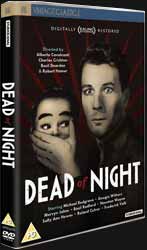|
Click here to return to the main site. DVD Review
Walter Craig is invited to a country mansion he has never been to before. However, the moment he walks in he knows instinctively where to hang his hat and coat. As he is introduced to the other guests, he tells them he knows them already, and goes as far as to say they are one short: a brunette woman will arrive late citing money problems. The strangers are intrigued, so he tells them he has dreamed about this situation on a regular basis. A psychoanalyst among their number tries to rationalise what is happening, but Craig tells him he will accidentally break his glasses, which he later does. The others are prepared to believe Craig to a certain extent, as they have each experienced something which defies logical explanation. Each of the guests in turn tell their tale, and even the psychoanalyst has a story which, of course, he attempts to define. But why is Craig at the house, and what will happen when they reach the point where his dream usually ends with a dark sense of foreboding... Dead of Night is a classic film from 1945, which caught everyone by surprise upon its release. Ealing Studios had never before attempted a horror. In fact, the four directors involved would probably not have described it as such, but rather a supernatural or more likely psychological thriller. Of course, the idea of a portmanteau wasn’t new even then. It had been tackled back in the 1930s. But the stories work so well because of the strong and suspenseful linking narrative. In fact, the discussion between the guests – although taking place all in one room – is so gripping that, rather than simply linking the short stories together, it is the stories themselves which are very nearly a means to an end. For me, the best of the anthology stories here is the one with the racing driver, even though it hinges on one moment. The driver nearly dies in a race crash and thereafter spends a long time in a hospital room. One night he is drawn to look at the closed curtains across the window. Cleverly, the music stops here and there is complete silence. When he whips back the curtains it has changed from night to daytime. Outside, is a horse drawn hearse. The hearse driver sees him at the window and jovially announces, ‘Room for one more inside.’ Later, when the racing driver leaves hospital and attempts to climb aboard a full bus, the conductor – the same man as the hearse driver – says, ‘Room for one more inside.’ Understandably, he elects not to get on, and thereby prevents his own death when the bus crashes. In another tale, a young woman plays hide and seek in a strange house at a Christmas party. She finds a sad boy in period clothing and comforts him, only to learn later that the boy was killed by his sister many years before. A woman buys her husband an antique mirror as a gift, and he begins to see another room reflected in it. He becomes more unbalanced as time goes on, believing himself to be going insane. But his wife discovers that a previous owner had killed his wife and then himself in view of the mirror. The golf comedy comes in for a lot of criticism (and it is rather contrived at times, though being loosely based on an H.G. Wells story), it works well as a plot device to break the increasing tension between the guests, before ratcheting it up again. Two friends and golfers fall in love with the same woman, who can’t decide between them, so they play a round of golf for the right to marry her. One of them cheats to win, and the other commits suicide (which is dark in itself). But he returns to haunt the other man when he realises he has been tricked. The story has a number of plot faults which are rushed over in favour of the inherent comedy aspect. I can understand what was trying to be achieved here, but it’s overly long, too. The psychologist’s story of the ventriloquist dummy, which would seem to be alive and controlling events, is by far the most well-known tale here. Newcomers to this film will surely reason that this is an old concept, with films like Magic and the Child’s Play franchise having emerged. But what needs to be understood is that Dead of Night was the first time it had been done on screen, and would surely have been quite chilling at the time. Near the end there is a masterful montage of off-kilter vignettes, with the protagonist attempting to escape the house by running through and becoming a part of all the stories we have just witnessed. This is a well-filmed conclusion in the vein of a nightmare – which is only logical given the circumstances. This really is a film worth investing in a copy of. There is also a very interesting 75 minute featurette, incorporating the thoughts of many film historians/critics, but it is severely lacking the presence of the most entertaining critic, Mark Kermode. There is also a restoration comparison. 8 Ty Power Buy this item online
|
|---|


